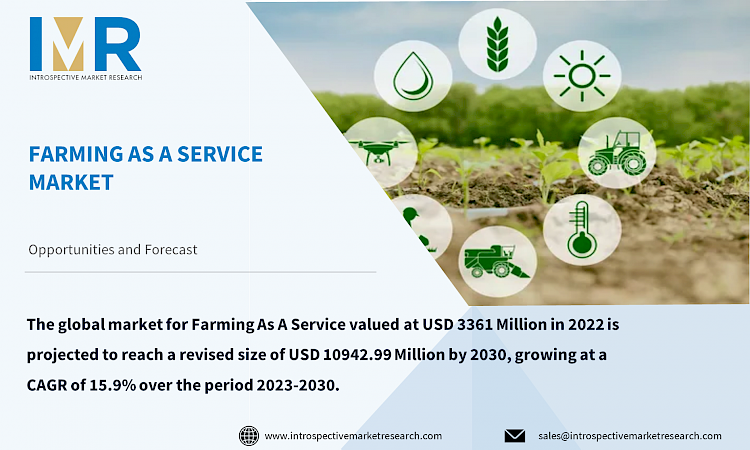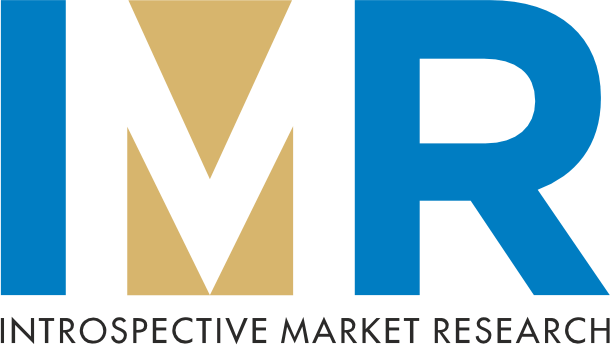
The global market for Farming as A Service valued at USD 3361 Million in 2022 is projected to reach a revised size of USD 10942.99 Million by 2030, growing at a CAGR of 15.9%.
Introduction to Farming as A Service:
The Farming as a Service (FaaS) market presents several compelling opportunities driven by the evolving landscape of agriculture and technological advancements. One significant opportunity lies in sustainable agriculture practices. As concerns about environmental sustainability and the impact of agriculture on ecosystems grow, FaaS can play a pivotal role in promoting precision farming techniques that minimize resource wastage, reduce chemical inputs, and optimize crop yields. FaaS solutions, such as IoT-based sensors and data analytics, enable farmers to monitor soil conditions, water usage, and pest infestations with great precision, allowing for the implementation of eco-friendly farming practices. The demand for sustainable and environmentally responsible agriculture creates a substantial opportunity for FaaS providers to offer solutions that align with these evolving priorities.
Major Key Players:
- Agribolo
- Ninjacart
- Mahindra & Mahindra Ltd
- John Deere
- Apollo Agriculture
- IBM
- Ekylibre
- iDrone Services
- Farmlyplace
- BigHaat
- Accenture
- Trimble
- Taranis
Market Dynamics and Factors Influencing Growth:
Drivers:
The Farming as a Service (FaaS) market is experiencing significant growth driven by several key drivers. One primary driver is the increasing need for precision agriculture. Modern farming is becoming more data-driven and technology-intensive, requiring tools and services that can help farmers make informed decisions about crop management, resource allocation, and yield optimization. FaaS solutions offer access to a range of technologies, including sensors, drones, GPS systems, and data analytics, enabling farmers to monitor and manage their operations with unprecedented precision. This precision not only enhances crop yields and resource efficiency but also addresses sustainability concerns, making FaaS an attractive choice for farmers looking to adopt more sustainable and profitable farming practices.
Restraints:
Data privacy and security concerns represent another significant restraint for the FaaS market. The collection and utilization of sensitive agricultural data, including crop yields, soil conditions, and farming practices, raise privacy and cybersecurity challenges. Farmers worry about the potential misuse of their data, including unauthorized access or sharing with third parties. Ensuring the security and responsible handling of agricultural data is paramount to gaining farmers' trust and encouraging them to embrace FaaS solutions.
Opportunities:
The integration of FaaS with artificial intelligence (AI) and machine learning presents an opportunity for enhanced decision-making in agriculture. AI-powered FaaS solutions can analyze vast datasets from sensors, drones, and satellites to provide farmers with actionable insights in real-time. These insights may include optimal planting times, disease detection, and yield predictions, allowing farmers to make data-driven decisions that improve crop quality and quantity. As AI continues to advance, the potential for AI-driven FaaS applications to revolutionize agriculture by enhancing productivity and profitability is substantial. This opportunity is especially relevant as farmers seek ways to meet the growing demand for high-quality agricultural products efficiently.
Farming as A Service Market Segmentation:
Market Segmentation:
By Solutions
- Farm Management
- Production Assistance
- Access to Market
By Delivery Model
- Pay-Per-Use
- Subscription
By End User
- Corporates
- Financial Institution
- Farmer
- Government
- Advisory Bodies
Solutions of the Product: The segmentation of the Farming as a Service (FaaS) market by solutions, specifically "Farm Management," is driven by the comprehensive suite of digital tools and services aimed at optimizing various aspects of farming operations. Farm management solutions within FaaS encompass a wide range of applications, including crop monitoring, soil analysis, weather forecasting, livestock management, and yield optimization.
Delivery Model: The segmentation of the Farming as a Service (FaaS) market by the delivery model, specifically as "Pay-Per-Use," is driven by the need to provide farmers with a flexible and cost-efficient approach to adopting technology-driven agricultural solutions
End User: The segmentation of the Farming as a Service (FaaS) market by end-user category, specifically as "Corporations," is driven by the recognition that large agricultural corporations and agribusinesses have distinct needs and resources when it comes to adopting advanced farming technologies.
For this report, Introspective Market Research has segmented the Farming A Service Market based on region:
Regional Outlook (Revenue in USD Million; Volume in Units, 2023-2030)
North America
- The U.S.
- Canada
- Mexico
Eastern Europe
- Russia
- Bulgaria
- The Czech Republic
- Hungary
- Poland
- Romania
- Rest of Eastern Europe
Western Europe
- Germany
- UK
- France
- Netherlands
- Italy
- Spain
- Rest of Western Europe
Asia Pacific
- China
- India
- Japan
- Singapore
- Australia
- New-Zealand
- Rest of APAC
Middle East & Africa
- Turkey
- Saudi Arabia
- Qatar
- UAE
- Israel
- South Africa
South America
- Brazil
- Argentina
- Rest of SA




